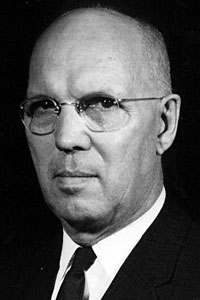Dr. Rudolph Frederick Peterson was one of Canada’s outstanding wheat breeders.
He was born in Winnipeg in 1900, graduated from the University of Manitoba in 1930 and from the University of Minnesota in 1933. He married the former Bertha Bowman and they raised two sons.
Dr. Peterson began his career as a wheat breeder in 1935 at the former Dominion Laboratory of Cereal Breeding and from 1948 to 1965 served as the head of the cereal breeding section of the research station at Winnipeg. The highlight of his career was the development of the spring wheat variety, Selkirk, that provided resistance to a race of stem rust that occurred as epidemics in 1953 and 1954 in Western Canada and the U.S. By 1956, most of the wheat acreage of Manitoba, eastern Saskatchewan and North Dakota was sown to Selkirk and the savings realized by farmers amounted to millions of dollars.
Immediately after his retirement in 1965, he accepted a two-year assignment with the University of Manitoba to direct the wheat breeding program at the Plant Breeding Station, Njoro, Kenya, as part of the Department of External Affairs Foreign Aid Program.
Dr. Peterson was recognized internationally for his outstanding research with wheat and for his book, Wheat – Botany, Cultivation and Utilization, published in 1965. He was honored with a life membership in the Swedish Seed Association in 1961 and was an honorary life member of the Agricultural Institute of Canada and a member of the Sigma Xi and the Gamma Sigma Delta fraternities.
Dr. Peterson worked toward the formation of the Fort Garry Community Club; was a member of Fort Garry United Church; wrote, with his wife, children’s songs and had a deep appreciation for literature and music.
This gentleman will be remembered throughout the world for his commitment to developing the most productive, disease resistant varieties of wheat possible.


